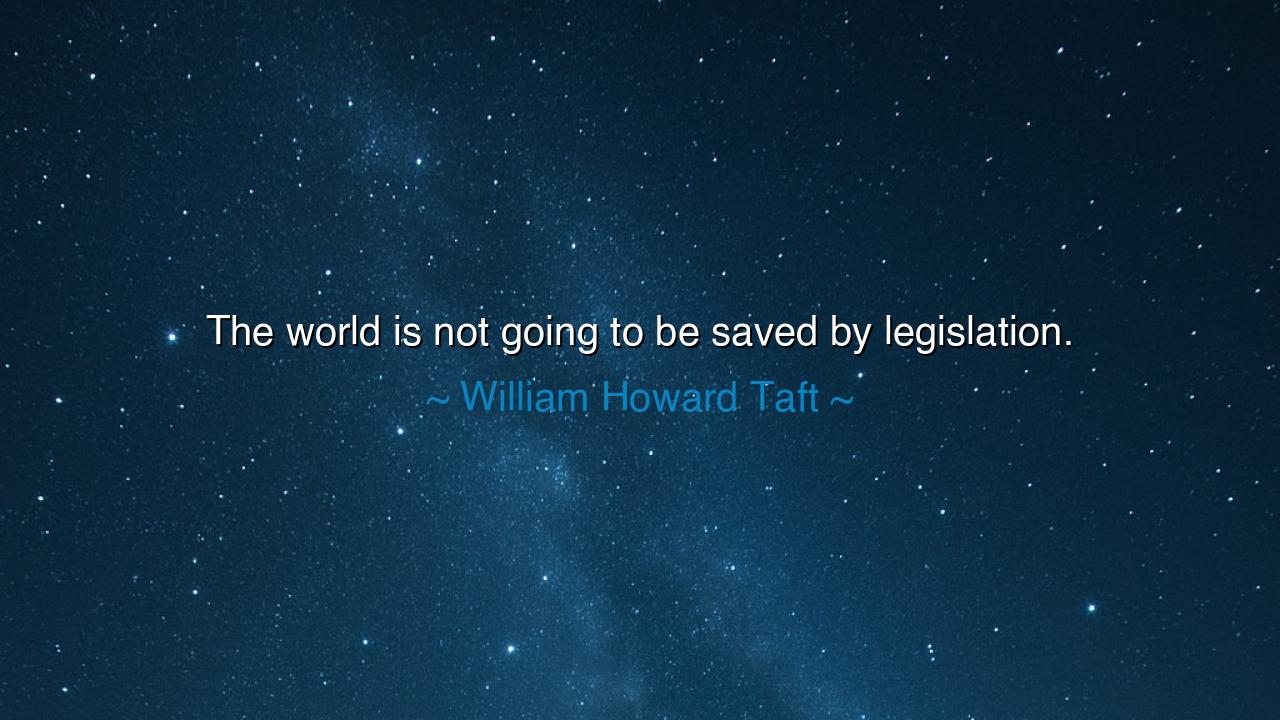
The world is not going to be saved by legislation.






In the solemn cadence of history, the voice of William Howard Taft, the twenty-seventh President of the United States, speaks with quiet wisdom: “The world is not going to be saved by legislation.” These words, though simple in form, are heavy with meaning. They remind us that the redemption of mankind cannot be written into law, nor can virtue be commanded by decree. Taft, a man of the law himself—a judge before and after his presidency—understood the limits of power and the frailty of human nature. He knew that while laws can restrain the hand, they cannot purify the heart. The true salvation of the world must come not from the pen of the legislator, but from the conscience of the individual.
Taft spoke in an age of reform, when America was aflame with movements to purify politics, uplift labor, and regulate wealth. He lived in a time when faith in government was swelling—when people believed that every ill of society could be cured by a new law, a new act, or a new regulation. But Taft, though not blind to the need for reform, saw a deeper truth: that legislation can mend structures, but not souls. To legislate morality is to build walls without foundations; to trust government for salvation is to forget that virtue begins in the heart of man. His words were not a rejection of law, but a call to wisdom—to remember that laws are only as good as the people who live by them.
This truth has been proved by the long arc of history. Consider the story of Prohibition in the early twentieth century. The nation, believing that alcohol was the root of vice, passed a constitutional amendment banning its sale. Lawmakers thought they could legislate temperance and save the nation from moral decay. Yet what followed was not purity, but corruption. Speakeasies flourished, crime syndicates grew powerful, and the very law meant to bring order bred chaos instead. The legislation failed, not because the intention was evil, but because it tried to control by force what can only be changed by choice. Temperance, like all virtue, must arise from the will of the people, not the decree of the state.
Taft’s insight is echoed by the ancient philosophers. The great Aristotle taught that good laws depend upon good citizens, for even the finest constitution will fail in the hands of the corrupt. Likewise, Cicero said that the law is a reflection of reason, not its master. These men knew, as Taft did, that the law is but a guidepost; the journey toward justice must be walked by human character. A nation may pass a thousand statutes and still remain unjust if its people do not live by conscience. For while laws can govern behavior, they cannot govern the soul. The salvation of the world, therefore, lies not in the number of its laws, but in the virtue of its citizens.
Even in our modern age, Taft’s wisdom shines through. We live in a time when every crisis seems to call for new legislation—when people believe that the right bill or the right leader can heal all wounds. Yet despite the countless laws that have been written, the world remains troubled, divided, and in need of compassion. Why? Because legislation cannot teach mercy, cannot create empathy, cannot inspire love. Those things must be born in the heart. The world will not be saved by law, but by those who live in truth, who act with courage, who treat one another with justice even when no law compels them to do so.
This is not to say that laws are worthless. They are necessary—guardrails against chaos, instruments of justice, the bones upon which a society is built. But they are not the breath of that society. Without the spirit of goodness and integrity, laws become hollow, manipulated by those they were meant to restrain. The greatest constitutions will fail where virtue fails. A nation of just laws requires first a nation of just hearts. Taft’s words, therefore, are a summons to moral responsibility: do not look to government to make you righteous; look instead to yourself.
The lesson, then, is clear and enduring: true change begins not in the halls of power, but in the human heart. If you would make the world better, do not wait for the law to command you—act from conscience. Do not hope for legislation to save you—save others through compassion, courage, and truth. Laws can prevent harm, but only love can heal. The world will not be saved by legislation, but by people who live as though it already is worth saving.
So, my child of the republic, remember Taft’s wisdom: trust in law to protect, but in virtue to redeem. Let your actions be just even when no one watches, and your mercy abundant even when the law is silent. For the salvation of the world lies not in parchment or policy, but in the living flame of righteousness within every human soul. When each person becomes a law unto themselves—not of tyranny, but of conscience—then, and only then, shall the world be truly free.






AAdministratorAdministrator
Welcome, honored guests. Please leave a comment, we will respond soon